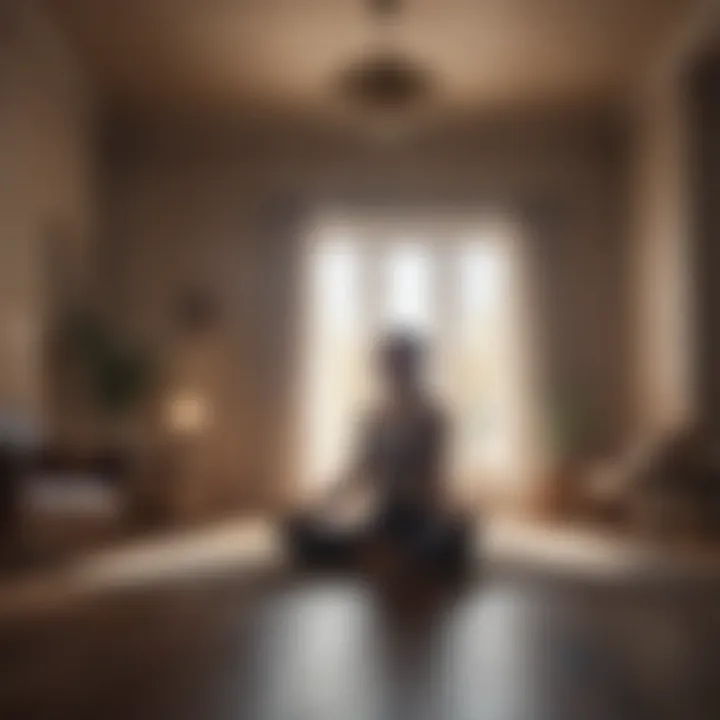Insights into Coping with Nocturnal Anxiety and Enhancing Sleep Quality


Research Overview
This section initiates a detailed exploration of the nocturnal phenomenon known as nighttime anxiety. By delving into the intricacies of waking up with anxiety during the night, we aim to shed light on the possible triggers and contributing factors. Understanding the root causes of this experience is vital in formulating effective strategies to manage and alleviate nighttime anxiety episodes successfully.
Health Implications
As we navigate through the impact of nighttime anxiety on overall health, it becomes evident that these episodes can significantly disrupt individuals' sleep patterns and jeopardize their well-being. By dissecting the consequences of experiencing anxiety at night, we uncover the potential risks and benefits associated with such occurrences. Furthermore, we delve into practical examples illustrating how the findings of this research can be applied to daily life, offering a comprehensive perspective on managing nighttime anxiety for improved health outcomes.
Well-being Strategies
Within this section, we compile a comprehensive array of practical tips and strategies derived from insightful research. These evidence-based recommendations serve as a guide for individuals seeking to implement positive changes to enhance their overall well-being and effectively manage nighttime anxiety. Through the integration of personal stories and case studies, we aim to provide a tangible understanding of how these strategies can be successfully adopted, offering readers actionable steps towards controlling nighttime anxiety and promoting healthier sleep habits.
Expert Insights
In this segment, we analyze expert opinions on the research findings related to nighttime anxiety, highlighting the significance of these insights in understanding and managing this nocturnal affliction. Additionally, we engage in a Q&A session with a reputable authority in the field, delving into nuanced discussions surrounding effective strategies for coping with nighttime anxiety. By synthesizing expert perspectives with empirical evidence, readers gain a holistic view of the topic, equipping them with valuable knowledge to navigate and mitigate nighttime anxiety episodes successfully.
Introduction
Defining Nighttime Anxiety
Understanding the concept of nighttime anxiety
Nighttime anxiety refers to the experience of feeling anxious or distressed specifically during nighttime hours, disrupting sleep patterns and causing emotional turmoil. This aspect of anxiety is unique in its manifestation during the night, often triggered by various stressors or underlying psychological factors. Understanding the concept of nighttime anxiety is crucial in addressing its effects on sleep quality and mental health, making it a pivotal topic for discussion in this article. By highlighting the distinctive characteristics of nighttime anxiety, individuals can identify and address this specific form of anxiety efficiently, leading to improved overall well-being.
Prevalence and Impact
Statistics on the prevalence of nighttime anxiety
Nighttime anxiety is more common than often acknowledged, with a significant portion of the population experiencing this phenomenon at some point in their lives. Understanding the statistics related to the prevalence of nighttime anxiety is essential in recognizing the widespread nature of this issue and its implications for individuals' sleep patterns and emotional stability. By exploring the prevalence rates, individuals can feel validated in their experiences and seek appropriate help if needed, fostering a sense of understanding and community around nighttime anxiety.
Impact on mental and physical health
The impact of nighttime anxiety goes beyond sleep disturbances, extending to profound effects on individuals' mental and physical well-being. This aspect of anxiety can lead to heightened stress levels, decreased cognitive function, and even exacerbate pre-existing health conditions. Exploring the impact of nighttime anxiety on mental and physical health is vital for comprehending the full scope of its consequences and motivating individuals to prioritize effective management strategies. By acknowledging the far-reaching effects of nighttime anxiety, individuals can take proactive steps towards optimizing their health outcomes and overall quality of life.


Causes of Nighttime Anxiety
The section on Causes of Nighttime Anxiety is a pivotal component of this article. Understanding the various factors that contribute to nighttime anxiety is essential for effectively managing and addressing this issue. By delving into the root causes of nighttime anxiety, readers can gain valuable insights into why these episodes occur and how they can be mitigated. Highlighting the significance of exploring these causes sets the stage for a comprehensive examination of nighttime anxiety, offering a holistic approach to tackling this common yet distressing experience.
Stress and Overthinking
Impact of stress on nighttime anxiety
Stress plays a significant role in exacerbating nighttime anxiety. The relentless pressure and strain from various sources can manifest during sleep, leading to heightened levels of anxiety. Understanding how stress impacts nighttime anxiety provides valuable knowledge for individuals looking to manage this condition effectively. By shedding light on the relationship between stress and nighttime anxiety, readers can learn to identify and address stressors that may be contributing to their nighttime distress.
The role of overthinking in triggering anxiety at night
Overthinking serves as a common trigger for anxiety during the night. The incessant rumination and worry can intensify feelings of anxiety, making it difficult to relax and fall asleep. Exploring the role of overthinking in nighttime anxiety sheds light on the mental processes that contribute to this issue. By examining the impact of overthinking on nighttime anxiety, readers can develop strategies to quieten their minds and promote a sense of calm before bedtime.
Underlying Mental Health Conditions
Anxiety disorders and their relation to nighttime anxiety
Anxiety disorders are closely linked to nighttime anxiety, amplifying feelings of unease and restlessness during the night. Understanding how anxiety disorders contribute to nighttime anxiety offers crucial insights into the complexity of this condition. By elucidating the connection between anxiety disorders and nighttime distress, readers can contemplate personalized approaches to address both their underlying anxiety issues and nighttime symptoms.
Depression and its influence on nighttime emotional distress
Depression can significantly impact nighttime emotional well-being, leading to increased vulnerability to anxiety episodes during the night. Exploring the influence of depression on nighttime distress provides a nuanced understanding of the emotional intricacies at play. By recognizing the effects of depression on nighttime emotional distress, readers can take proactive steps to manage their mental health and improve their overall well-being.
Environmental Factors
Effects of environment on nighttime anxiety
Environmental conditions can have a profound impact on nighttime anxiety, influencing the quality of sleep and overall mental tranquillity during the night. Exploring how environmental factors contribute to nighttime anxiety allows readers to evaluate their sleep surroundings and make necessary adjustments for better rest. By discerning the effects of the environment on nighttime anxiety, individuals can create a conducive sleep environment that promotes relaxation and diminishes anxiety.
Noise, light, and temperature impact
Noise, light, and temperature play critical roles in determining the level of comfort and serenity during sleep, directly affecting nighttime anxiety levels. Understanding how these factors impact nighttime anxiety sheds light on the importance of optimizing the sleep environment. By examining the influence of noise, light, and temperature on nighttime anxiety, readers can make informed choices to create a tranquil setting conducive to restorative sleep.


Medication and Substance Use
The influence of certain medications on nighttime anxiety
Certain medications may either alleviate or exacerbate nighttime anxiety, depending on their properties and effects on the body. Exploring how specific medications influence nighttime anxiety is crucial for individuals managing this condition. By delving into the impact of medications on nighttime anxiety, readers can make informed decisions regarding their treatment and consult healthcare professionals when necessary.
The role of caffeine, alcohol, and stimulants
Caffeine, alcohol, and stimulants can significantly influence nighttime anxiety, either aggravating or alleviating symptoms depending on individual responses. Understanding the role of these substances in nighttime anxiety offers insights into lifestyle adjustments that may be beneficial. By examining the effects of caffeine, alcohol, and stimulants on nighttime anxiety, readers can evaluate their consumption habits and make modifications to support better sleep quality and mental well-being.
Symptoms and Manifestations
Common Signs of Nighttime Anxiety
Physical symptoms during nighttime anxiety
Exploring the intricate details of physical symptoms during nighttime anxiety sheds light on the tangible effects individuals may encounter. These symptoms capture the physiological responses triggered by anxiety, such as shortness of breath, digestive issues, and restlessness. Their prominence lies in their ability to manifest concretely, offering visible cues of internal distress. By elucidating these physical manifestations, individuals can discern the subtle yet impactful ways anxiety permeates their nightly experiences.
Emotional manifestations experienced
Insights into the emotional manifestations experienced amid nighttime anxiety unveil the psychological facets entwined with this condition. Emotions like worry, sadness, and irritability can dominate the night, disrupting emotional equilibrium. Understanding these emotional nuances is pivotal in addressing the root causes of nighttime anxiety, fostering emotional resilience, and enhancing coping mechanisms.
Impact on Sleep Quality
Consequences of poor sleep due to nighttime anxiety
Navigating the consequences of poor sleep resulting from nighttime anxiety underscores the far-reaching implications of this condition. Fatigue, daytime drowsiness, and impaired cognitive function are hallmark outcomes of inadequate sleep quality influenced by nighttime anxiety. These consequences permeate various facets of an individual's life, affecting productivity, mood regulation, and overall well-being. Examining the repercussions of poor sleep due to nighttime anxiety underscores the compound effects of untreated nighttime anxiety on both physical and mental health.
Management and Coping Strategies
In this article, delving into nighttime anxiety, understanding management, and coping strategies are vital components for addressing this issue effectively. Incorporating well-rounded measures to combat nighttime anxiety can significantly improve overall mental well-being. By focusing on specific elements such as bedtime routines, cognitive behavioral techniques, and professional support, individuals can develop a comprehensive approach to managing their nocturnal concerns.
Creating a Relaxing Bedtime Routine


Establishing Calming Pre-Sleep Rituals
Integrating calming pre-sleep rituals into one's bedtime routine is crucial for reducing nighttime anxiety. These rituals can include activities like reading a book, taking a warm bath, or listening to calming music. The key characteristic of establishing these rituals lies in their ability to signal the brain that it is time to unwind and prepare for sleep. This consistent practice helps train the mind and body to associate these activities with relaxation, paving the way for a peaceful transition into sleep. The unique feature of these rituals is their ability to create a calming environment that promotes relaxation and reduces stress, making them a popular choice for those dealing with nighttime anxiety.
Mindfulness and Meditation Practices
Incorporating mindfulness and meditation practices into a bedtime routine can be highly beneficial for managing nighttime anxiety. These practices involve focusing on the present moment, acknowledging thoughts and feelings without judgment, and cultivating inner peace. The key characteristic of mindfulness and meditation is their ability to reduce racing thoughts and induce a sense of calm, preparing the mind for a restful night's sleep. The unique feature of these practices is their effectiveness in promoting relaxation, enhancing self-awareness, and improving overall mental well-being. While there are no significant disadvantages to mindfulness and meditation, their advantages lay in their ability to quiet the mind and promote tranquility before sleep.
Cognitive Behavioral Techniques
Identifying and Challenging Negative Thought Patterns
Identifying and challenging negative thought patterns is a fundamental aspect of cognitive-behavioral techniques for managing nighttime anxiety. By recognizing and reframing distorted thoughts related to sleep and anxiety, individuals can break free from cyclical patterns of worry and fear. The key characteristic of this technique is its emphasis on changing irrational beliefs and replacing them with rational, positive thoughts. This process helps reduce anxiety and promote a more balanced perspective on nightly concerns. The unique feature of identifying and challenging negative thought patterns is its empowering nature, allowing individuals to take control of their thoughts and emotions to improve sleep quality and overall well-being.
Implementing Relaxation Exercises
Implementing relaxation exercises as part of a nighttime routine can significantly alleviate anxiety and promote better sleep. These exercises may include deep breathing, progressive muscle relaxation, or visualization techniques. The key characteristic of relaxation exercises is their ability to reduce physical tension, slow down the heart rate, and induce a state of relaxation conducive to sleep. The unique feature of these exercises is their versatility, as they can be customized to suit individual preferences and needs. While the advantages of relaxation exercises are abundant, including stress reduction and improved sleep quality, the only potential disadvantage lies in finding the right technique that resonates best with each individual.
Professional Support and Therapy
Consulting a Therapist or Counselor for Guidance
Seeking professional support from a therapist or counselor is a valuable option for individuals grappling with nighttime anxiety. These professionals can offer guidance, support, and evidence-based therapies to address underlying issues contributing to nocturnal distress. The key characteristic of consulting a therapist or counselor is their expertise in providing customized strategies to manage anxiety and improve sleep quality. This personalized approach ensures that individuals receive tailored support that meets their specific needs. The unique feature of professional guidance is its potential to uncover deep-seated factors fueling nighttime anxiety and empower individuals to make positive changes for better mental health and sleep.
Exploring Treatment Options for Underlying Conditions
Exploring treatment options for underlying conditions associated with nighttime anxiety is essential for long-term relief. By addressing any co-existing mental health issues such as anxiety disorders or depression, individuals can effectively manage their symptoms and improve overall well-being. The key characteristic of exploring treatment options is to target the root cause of nighttime anxiety, leading to comprehensive treatment and sustained recovery. The unique feature of this approach is its holistic nature, considering the interconnectedness of mental health to promote overall wellness. While the advantages of exploring treatment options are extensive, the main challenge may lie in finding the most suitable intervention that aligns with individual needs and preferences.
Conclusion
Wrapping Up Nighttime Anxiety
Reiterating the impact of nighttime anxiety
In reaffirming the impact of nighttime anxiety, it becomes evident that the repercussions extend beyond mere insomnia. Nighttime anxiety disrupts the natural sleep cycle, leading to fatigue and cognitive impairment during the day. Understanding its pervasive influence on mental and physical health is paramount in mitigating the broader consequences of this issue. By emphasizing the profound effects of this condition, individuals can prioritize adequate care and seek appropriate interventions to restore balance to their lives.
Encouraging proactive steps towards better sleep and mental well-being
Encouraging proactive steps towards better sleep and mental well-being is a cornerstone of effective nighttime anxiety management. By instilling the importance of developing healthy bedtime routines and incorporating relaxation techniques, individuals can cultivate a conducive sleep environment. This proactive approach empowers individuals to reclaim control over their sleep quality and emotional well-being. By advocating for proactive measures, this article aims to inspire readers to take charge of their nighttime anxiety and embark on a journey towards improved sleep hygiene and mental health.



